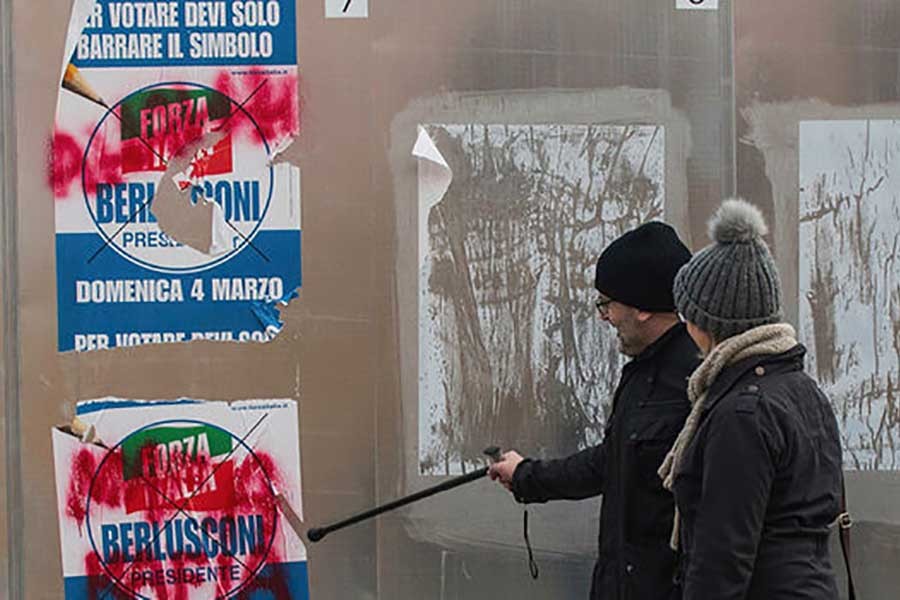As expected, the latest Italian general election held on March 04 has reflected the populist surge that has been sweeping across Europe - in Netherlands, Austria, France and Germany. Italian voters, to no one's surprise, backed anti-immigrant, anti-establishment parties and have now created a complex scenario in that country. They have also indicated an increase in support for anti-European parties in Sunday's parliamentary election. No single party, however, appears to have received enough votes to rule alone. This means that the country is likely to enter a period of political deadlock. We have seen such a situation affecting Germany for quite a few months.
Voters in Italy, as BBC has noted, punished their centre-left government as the voters in so many other European countries punished their centre-left governments.
The anti-establishment Five Star Movement (M5S) Party, bagging 31 per cent of votes, made a significant gain. Of its coalition partners, the anti-immigrant League attracted 18 per cent of votes to Forza Italia, 14 per cent.
Founded in 2009 by Beppe Grillo and now led by 31-year-old Luigi di Maio, the M5S party has been described as anti-establishment, Eurosceptic and pro-environment.
Though M5S has rejected the left-right dichotomy of traditional politics, it is a member of the Europe of Freedom and Direct Democracy in the European Parliament. That group includes right-wing parties, such as the United Kingdom's UK Independence Party (UKIP) and the ultranationalist Sweden Democrats. Although M5S has consistently advocated leaving the EU and the euro, its leader has recently said that it preferred to stay in the bloc for the time being.
The center-right coalition, which includes the Northern League led by 44-year-old Matteo Salvini, a great admirer of President Donald Trump, former Prime Minister Silvio Berlusconi's Forza Italia and the neo-fascist Brothers of Italy, is likely to form the largest bloc in both houses of the country's parliament, with a combined share of votes totaling over 37 per cent. Such a scenario means that as no party secured a majority, the country faces weeks, if not months, of negotiations between groups with competing interests to form a government.
The centre-left Democratic Party under the joint stewardship of former premier Matteo Renzi and Prime Minister Paolo Gentiloni was the biggest loser in Sunday's polling. The party appeared to have gained only around 19 per cent of the overall vote, and its centre-left coalition around 23 per cent in total.
Italians are now faced with a hung parliament. The credibility of the election was reflected in the sober remark made by Democratic Party member and outgoing parliamentarian Andrea Marcucci. He said that the voters had spoken "clearly and incontrovertibly" and that "the populists had won and the (Democratic Party) had lost. We will start again in the opposition."
The poll is, however, being closely scrutinised by European leaders who are concerned by the increasingly eurosceptic sentiment and fearful of any instability in the Eurozone's third-largest economy. The election result means that Italy could be plunged into months of political deadlock and the Italians appear to be increasingly divided over issues such as undocumented immigration.
It must not be forgotten that Italy has been one of the main entry points into Europe for migrants from Africa, the Middle East and Asia. The narrative around immigration took a darker turn in February after a man linked with the League party apparently went on a shooting rampage targeting African migrants in the town of Macerata. The incident fuelled serious political debate about how the country is reconciling with its fascist past.
This development was not lost on US President Donald Trump's former strategic adviser Steve Bannon, who was in Rome to observe the elections. In an interview with Italy's Corriere della Sera, Bannon observed that an alliance between the anti-immigrant League party and the populist Five Star Movement was "the ultimate dream. This election is crucial for the global populist movement" as "it was an issue of "sovereignty" for Italians opposed to immigration. Another far-right politician, France's Marine Le Pen has also tweeted immediately after the projected results that it signalled an anti-EU sentiment in the southern European country. She remarked that "The European Union is going to have a horrible evening."
One needs at this point to note where the three important political groups of Italy stand on Migration, Europe and the Economy. The centre-right feels tha there should be deportation of illegal migrants, revision of European Union (EU) treaties and no more austerity policies. They also think that there should be facilitation of credit lines for small and medium-sized enterprises. The Democratic Party believes that aid should be stopped for countries refusing to share the burden of refugees, there should be more European political and social integration, and unemployment should be reduced to fewer than 9.0 while equal pay for women is established. The Five Star Movement wants revision of the Dublin Regulation and distribution of asylum seekers across Europe. They also want to find alternatives to the Euro. With regard to the economy they want free trade union representation, worker participation in decision-making, shorter working hours and incentivising part-time work.
Italy's economy, it may be noted, has started to expand once again but nearly 10 years on from the Global Financial Crisis, its gross domestic product (GDP) remains 5.7 per cent lower than pre-crisis levels.
The Italians will require unity for solving their problems and that does not seem imminent under the current conditions where the country is likely to witness political deadlock and a hung parliament.
Muhammad Zamir, a former Ambassador, is an analyst specialised in foreign affairs, right to information
and good governance.


